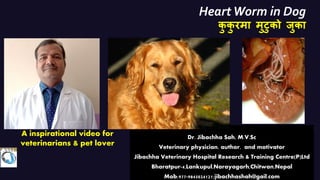Heart worm disease in dog
- 1. Heart Worm in Dog āĪ āĨ āĪ āĨ āĪ°āĪŪāĪū āĪŪāĨāĪāĨāĪāĨ āĪāĨāĪāĪū : Dr. Jibachha Sah, M.V.Sc Veterinary physician, author, and motivator Jibachha Veterinary Hospital Research & Training Centre(P)Ltd Bharatpur-4,Lankupul,Narayagarh,Chitwan,Nepal Mob;977-9845024121;jibachhashah@gail.com A inspirational video for veterinarians & pet lover
- 2. 2 Arthur Ashe āĪđāĪūāĪ°āĨāĪāĪĩāĪŪāĪ āĪ°āĨāĪ āĪāĪ āĪļāĪŪāĨāĪāĪūāĪĩāĪĩāĪĪ āĪāĪūāĪĪāĪ, āĪĪāĪ° āĪ°āĨāĪāĪĨāĪūāĪŪ āĪŊāĨāĪāĨāĪŊ āĪ, Heartworm disease is a potentially fatal, but preventable,
- 3. 3 āĪāĪūāĪ°āĪĢ (Cause) infection caused by a worm parasite, Dirofilaria immitis. āĪāĨāĪ°āĪū āĪŠāĪ°āĪāĨāĪĩāĨ, āĪĄāĨāĪ°āĨāĪŦāĪŋāĪąāĨāĪ°āĪ°āĪŊāĪū āĪāĪŪāĪŪāĪāĪ°āĨāĪļāĪŽāĪūāĪ°āĨ āĪđāĨāĪĻāĨ āĪļāĪāĪāĨāĪ°āĪŪāĪĢāĨĪ
- 4. āĪđāĪūāĪāĪāĪĩāĪŪāĪ āĪŦāĪŠāĨ āĪāĪūāĪāĪĻāĨ (heartworm spread): 4 Heartworm disease is only spread through the bite of a mosquito. āĪđāĪūāĪāĪāĪĩāĪŪāĪ āĪ°āĨāĪ āĪŪāĪūāĪĪāĨāĪ° āĪāĪāĪāĪū āĪąāĪūāĪŪāĪāĨāĪāĨāĪāĨāĪāĨ āĪāĨāĪāĪūāĪāĪąāĨ āĪŠ āĨ āĪēāĪąāĪĻāĨāĪ
- 5. 5 āĪ āĨ āĪ āĨ āĪ°āĪđāĪ°āĨāĪŪāĪū āĪŪāĨāĪ°āĨāĨāĪāĨ āĪāĨāĪāĪūāĪāĨ āĪąāĪšāĪĢ (Signs of heart worm in Dogs ) āĪąāĪāĪūāĪĪāĪūāĪ° āĪāĨāĪāĨ (persistent cough) āĪĩāĨāĪŊāĪūāĪŊāĪūāĪŪ āĪāĪĻāĪ āĪ āĪĻāĪĻāĪāĨāĪāĪū (reluctance to exercise) āĪĩāĨāĪŊāĪūāĪŊāĪūāĪŪ āĪāĪĻāĪ āĪ āĪĻāĪĻāĪāĨāĪāĪū
- 6. 6 āĪŪāĪ§āĨāĪŊāĪŪ āĪāĪĻāĪŋāĪĩāĪĩāĪ§āĪ§ āĪĐāĪĻāĪ āĪĨāĪāĪūāĪĻ (fatigue after moderate activity) āĪāĨāĪ āĪāĪŪ(decreased appetite)
- 7. 7 . āĪŋāĨāĪą āĪāĪāĨāĪĻāĨ ( weight loss.)
- 8. 8 āĪĐāĨāĪāĪŪāĪū āĪ āĪ§āĪ§āĪ āĪŋāĪ°āĪą āĪĐāĪĶāĪūāĪĨāĪāĪāĨ āĪāĪūāĪ°āĪĢ āĪĐāĨāĪ āĪŠ āĨ āĪąāĨāĪāĨ (swollen belly due to excess fluid in the abdomen.)
- 9. 9 āĪĻāĪĻāĪĶāĪūāĪĻ (Diagnosis)āĪāĪāĨāĪļ-āĪ°āĨ (x-ray) āĪŪāĨāĪāĨ āĪ āĨ āĪąāĨ (Heart enlarged /Cardiomegaly)
- 10. 10
- 11. 11 āĪ°āĪāĪŋ āĪāĪūāĨāĪ(Blood test) (āĪ°āĪāĪĪāĪŪāĪū āĪĄāĪūāĪŊāĪ°āĨāĪŦāĪŋāĪąāĨāĪ°āĪ°āĪŊāĪū āĪāĪŪāĪŪāĪāĪ°āĨāĪļ) Dirofilaria immitis in blood smear A case of heartworm at Jibachha veterinary hospital Chitwan
- 12. InsertYour Footer Here 12 āĪāĪĻāĨāĪ°āĨāĨāĪāĨāĪĻ āĪŠāĪ°āĨāĪšāĪĢ āĪŦāĪāĪ°āĨ (Antigen test kit) Mob.9849321557,www.Jibachhavet.com JibachhaVeterinary hospital(P) LTD,Jhamsikhel,Lalitpur, A case of heartworm at Jibachha veterinary hospital Lalitpur from Dharan
- 13. 13
- 15. 15 Many dogs will also be treated with an antibiotic (doxycycline) Treatment with anti-inflammatories, antibiotics, cage rest, supportive care, and intravenous fluids is usually effective in these cases.
- 17. 17
















